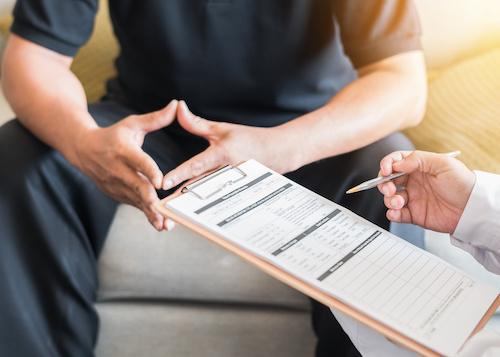Those dealing with addiction to drugs or alcohol often feel misunderstood. There’s actually a good reason for feeling this way. Often, there are underlying mental health symptoms that drive people to self-medicate with drugs or alcohol. Dual diagnosis treatment can include a depression treatment program or anxiety treatment program alongside addiction treatment. Getting to the root cause of an addiction can accelerate and prolong recovery, helping you find a more fulfilling way to live. Find out more about a dual diagnosis treatment program near you today to find out more about mental health and addiction.
What Is Dual Diagnosis?
When someone is given a dual diagnosis, it means they have symptoms of both addiction and a mental health diagnosis. This can include a range of different diagnoses, including:
- Depression
- Bipolar
- Mood disorders
- PTSD
- Anxiety
These mental health diagnoses can be life-threatening if not treated. Then, when someone self-medicates with drugs or alcohol, the situation becomes more dangerous. For people who are dealing with dual diagnosis, an integrated treatment approach can be more beneficial. Why? Because it treats the whole person, rather than trying to stop the addiction.
The stigma that follows people who are diagnosed with mental health or substance use disorders can make it difficult to seek treatment. Because of the combined effects of mental health symptoms and addiction, a dual diagnosis treatment program can offer a safe space for those dealing with stigma.
Getting dual diagnosis treatment will look different for each person, as clinicians tailor treatment plans to their clients’ needs. While dual diagnosis treatment is not easy, the positive impact it can have on your life is worth it. If you or someone you care about is dealing with mental health symptoms and substance abuse, don’t wait to find a dual diagnosis center near you.
Mental Health and Addiction
People who have mental health diagnoses usually start out unaware of what their symptoms mean, and that they’re not alone. The isolation, stigma, and loneliness people can feel due to mental health problems can make symptoms worsen. This can make it tempting to use drugs or alcohol to numb feelings of stress, depression, and anxiety.
When someone has a mental health diagnosis, they may be more vulnerable to developing an addiction. This is due to chemical deficits they are experiencing in the brain, specifically when it comes to dopamine and serotonin, or “feel good” chemicals.
The risks for those experiencing a mental health diagnosis alongside drug or alcohol addiction can include:
- Long-term medical problems including cardiac and respiratory conditions
- Loss of interest in daily activities, hobbies, and work
- Changes in sleep and appetite
- Behavior that is out of character, impulsive, or violent
- Legal issues, unemployment, and homelessness
In a dual diagnosis treatment program, it’s important to treat these issues with care and understanding. Going through detox and stabilization can be the most challenging part of recovery, and a dual diagnosis program can provide the additional support needed to get through it. When you surround yourself with those who are non-judgmental and committed to your long-term recovery, you can find a brighter future one step at a time.
Telehealth Treatment for Dual Diagnosis Can Help
Addiction and mental health symptoms can overwhelm your ability to carry out everyday tasks, even to the point of leaving your house. Social anxiety and difficulty making new friends can be serious obstacles for those needing treatment. With telehealth addiction and mental health treatment, you are connected easily and privately with life-saving treatment, anywhere you have an internet connection. Don’t let difficult symptoms keep you from finding the treatment you deserve. Reach out today to a dual diagnosis program near you to find out more about accessible and inclusive treatment.







